Walbank F.W., Astin A.E., Frederiksen M.W., Ogilvie R.M. The Cambridge Ancient History, Volume 7, Part 1: The Hellenistic World
Подождите немного. Документ загружается.

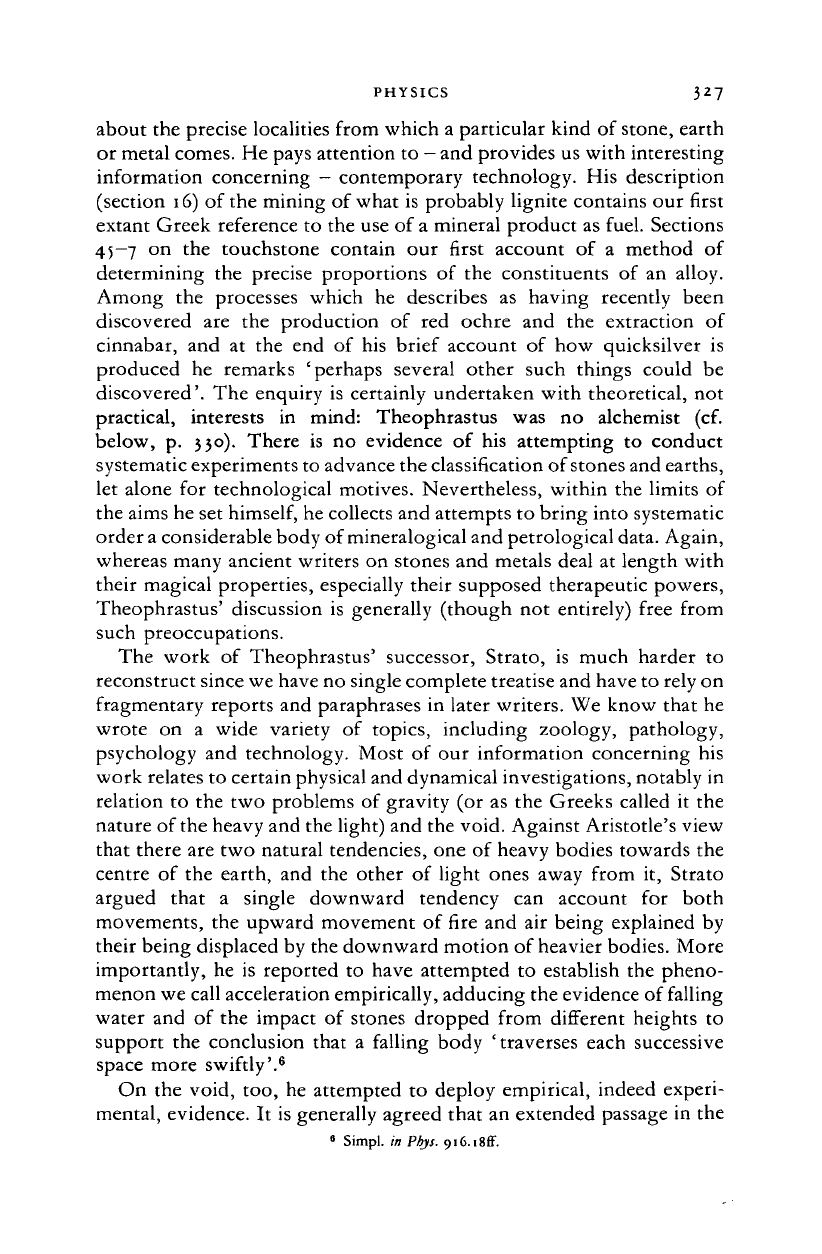
PHYSICS
327
about the precise localities from which a particular kind of stone, earth
or metal comes. He pays attention to
—
and provides us with interesting
information concerning
—
contemporary technology. His description
(section 16) of the mining of what is probably lignite contains our first
extant Greek reference to the use of a mineral product as fuel. Sections
45—7 on the touchstone contain our first account of a method of
determining the precise proportions of the constituents of an alloy.
Among the processes which he describes as having recently been
discovered are the production of red ochre and the extraction of
cinnabar, and at the end of his brief account of how quicksilver is
produced he remarks 'perhaps several other such things could be
discovered'. The enquiry is certainly undertaken with theoretical, not
practical, interests in mind: Theophrastus was no alchemist (cf.
below, p. 330). There is no evidence of his attempting to conduct
systematic experiments to advance the classification of stones and earths,
let alone for technological motives. Nevertheless, within the limits of
the aims he set
himself,
he collects and attempts to bring into systematic
order
a
considerable body of mineralogical and petrological data. Again,
whereas many ancient writers on stones and metals deal at length with
their magical properties, especially their supposed therapeutic powers,
Theophrastus' discussion is generally (though not entirely) free from
such preoccupations.
The work of Theophrastus' successor, Strato, is much harder to
reconstruct since we have no single complete treatise and have to rely on
fragmentary reports and paraphrases in later writers. We know that he
wrote on a wide variety of topics, including zoology, pathology,
psychology and technology. Most of our information concerning his
work relates to certain physical and dynamical investigations, notably in
relation to the two problems of gravity (or as the Greeks called it the
nature of
the
heavy and the light) and the void. Against Aristotle's view
that there are two natural tendencies, one of heavy bodies towards the
centre of the earth, and the other of light ones away from it, Strato
argued that a single downward tendency can account for both
movements, the upward movement of fire and air being explained by
their being displaced by the downward motion of heavier bodies. More
importantly, he is reported to have attempted to establish the pheno-
menon we call acceleration empirically, adducing the evidence of falling
water and of the impact of stones dropped from different heights to
support the conclusion that a falling body 'traverses each successive
space more swiftly'.
6
On the void, too, he attempted to deploy empirical, indeed experi-
mental, evidence. It is generally agreed that an extended passage in the
6
Simpl. in
Phys.
916.
i8ff.
Cambridge Histories Online © Cambridge University Press, 2008
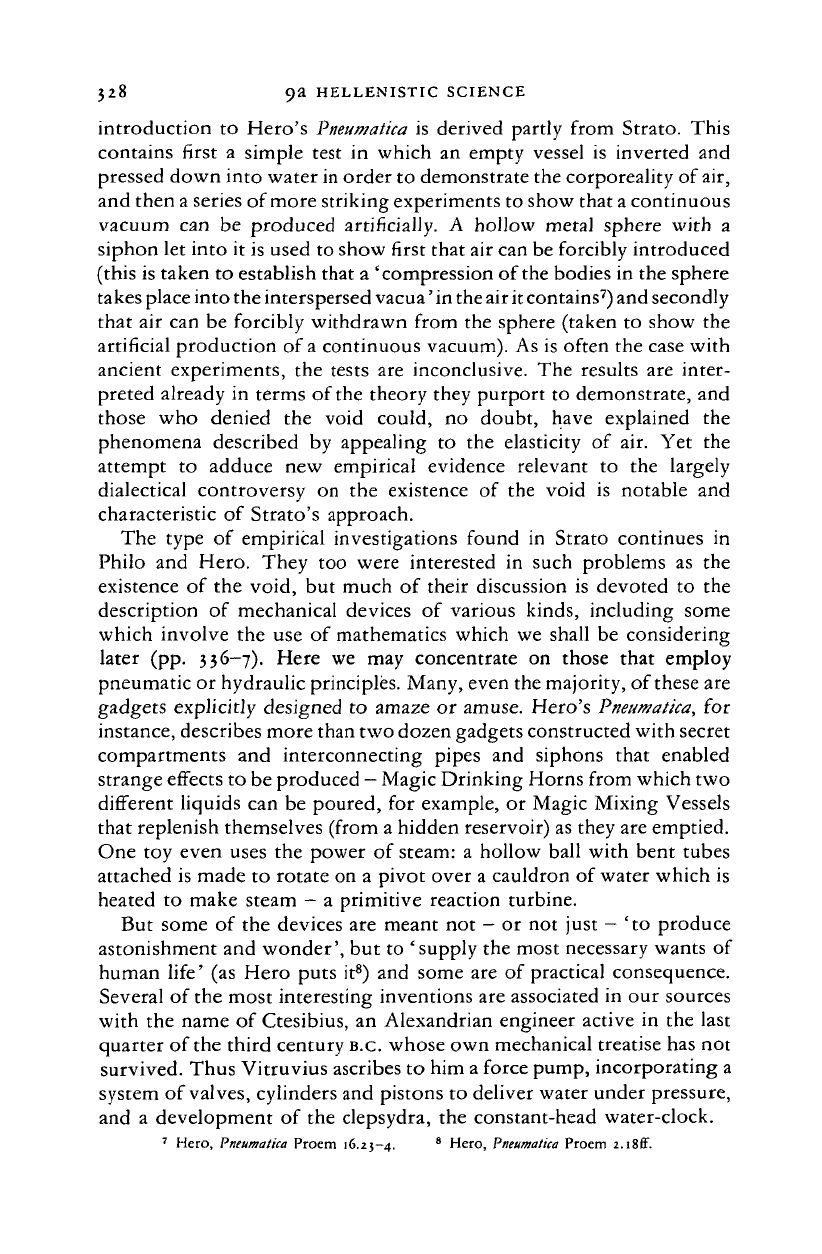
328 9
a
HELLENISTIC SCIENCE
introduction
to
Hero's
Pneumatica
is
derived partly from Strato. This
contains first
a
simple test
in
which
an
empty vessel
is
inverted
and
pressed down into water in order to demonstrate the corporeality of air,
and then a series of more striking experiments to show that a continuous
vacuum
can be
produced artificially.
A
hollow metal sphere with
a
siphon let into it is used to show first that air can be forcibly introduced
(this is taken to establish that a 'compression of
the
bodies in the sphere
takes place into the interspersed vacua'
in the
air
it
contains
7
) and secondly
that air can be forcibly withdrawn from the sphere (taken
to
show the
artificial production of
a
continuous vacuum). As is often the case with
ancient experiments, the tests
are
inconclusive. The results are inter-
preted already
in
terms of the theory they purport to demonstrate, and
those
who
denied
the
void could,
no
doubt, have explained
the
phenomena described
by
appealing
to the
elasticity
of
air.
Yet the
attempt
to
adduce
new
empirical evidence relevant
to the
largely
dialectical controversy
on the
existence
of the
void
is
notable
and
characteristic
of
Strato's approach.
The type
of
empirical investigations found
in
Strato continues
in
Philo
and
Hero. They
too
were interested
in
such problems
as the
existence
of
the void, but much
of
their discussion
is
devoted
to the
description
of
mechanical devices
of
various kinds, including some
which involve the use
of
mathematics which we shall
be
considering
later (pp. 336—7). Here
we may
concentrate
on
those that employ
pneumatic or hydraulic principles. Many, even the majority, of these are
gadgets explicitly designed
to
amaze
or
amuse. Hero's
Pneumatica,
for
instance, describes more than two dozen gadgets constructed with secret
compartments
and
interconnecting pipes
and
siphons that enabled
strange effects to be produced
—
Magic Drinking Horns from which two
different liquids can be poured,
for
example,
or
Magic Mixing Vessels
that replenish themselves (from a hidden reservoir) as they are emptied.
One toy even uses the power
of
steam:
a
hollow ball with bent tubes
attached is made
to
rotate on
a
pivot over a cauldron of water which
is
heated
to
make steam
—
a
primitive reaction turbine.
But some
of
the devices are meant not
- or
not just
- 'to
produce
astonishment and wonder', but to 'supply the most necessary wants of
human life' (as Hero puts it
8
) and some are
of
practical consequence.
Several of the most interesting inventions are associated in our sources
with the name
of
Ctesibius,
an
Alexandrian engineer active
in
the last
quarter of the third century
B.C.
whose own mechanical treatise has not
survived. Thus Vitruvius ascribes to him a force pump, incorporating a
system of
valves,
cylinders and pistons to deliver water under pressure,
and
a
development
of
the clepsydra, the constant-head water-clock.
7
Hero,
Pneumatica
Proem 16.23-4.
8
Hero,
Pneumatica
Proem
2.i8ff.
Cambridge Histories Online © Cambridge University Press, 2008
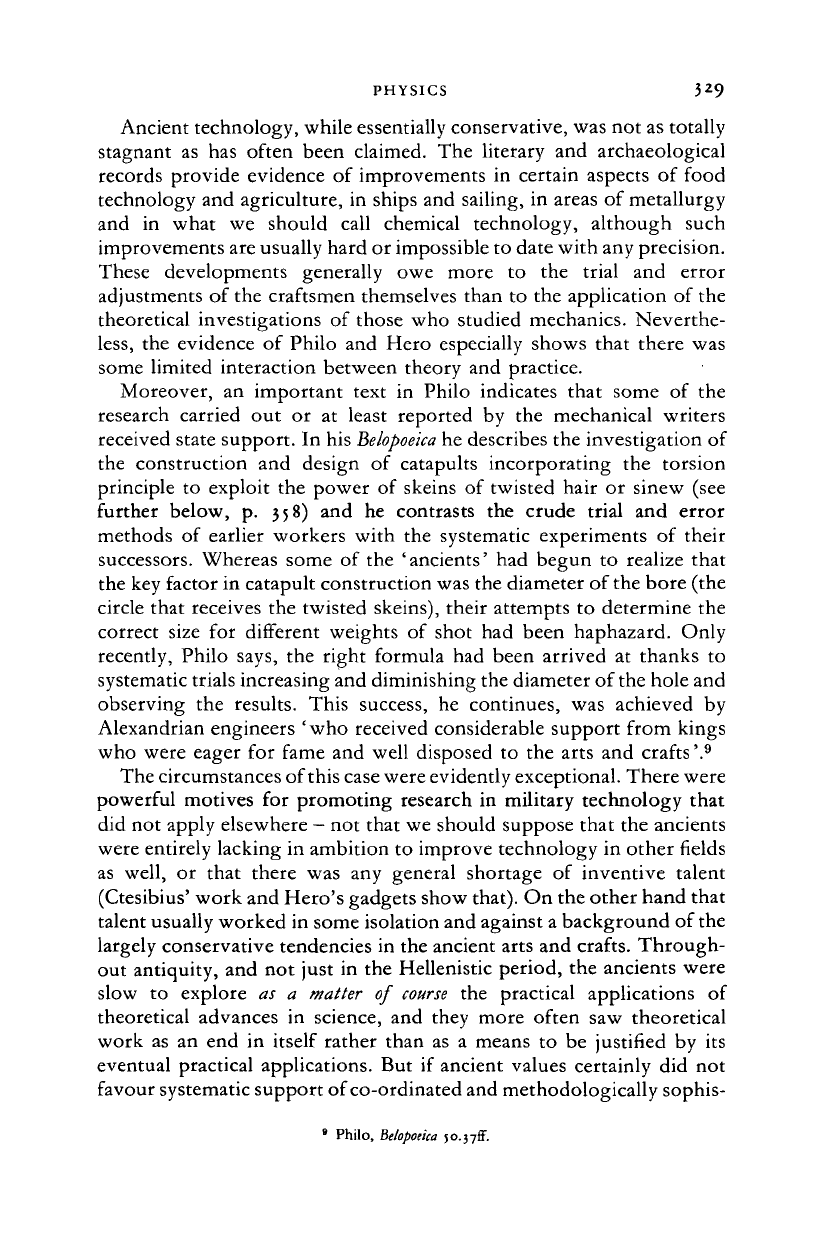
PHYSICS
3
2
9
Ancient technology, while essentially conservative, was not as totally
stagnant as has often been claimed. The literary and archaeological
records provide evidence of improvements in certain aspects of food
technology and agriculture, in ships and sailing, in areas of metallurgy
and in what we should call chemical technology, although such
improvements are usually hard or impossible to date with any precision.
These developments generally owe more to the trial and error
adjustments of the craftsmen themselves than to the application of the
theoretical investigations of those who studied mechanics. Neverthe-
less,
the evidence of Philo and Hero especially shows that there was
some limited interaction between theory and practice.
Moreover, an important text in Philo indicates that some of the
research carried out or at least reported by the mechanical writers
received state support. In his
Belopoeica
he describes the investigation of
the construction and design of catapults incorporating the torsion
principle to exploit the power of skeins of twisted hair or sinew (see
further below, p. 358) and he contrasts the crude trial and error
methods of earlier workers with the systematic experiments of their
successors. Whereas some of the 'ancients' had begun to realize that
the key factor in catapult construction was the diameter of
the
bore (the
circle that receives the twisted skeins), their attempts to determine the
correct size for different weights of shot had been haphazard. Only
recently, Philo says, the right formula had been arrived at thanks to
systematic trials increasing and diminishing the diameter of the hole and
observing the results. This success, he continues, was achieved by
Alexandrian engineers 'who received considerable support from kings
who were eager for fame and well disposed to the arts and crafts'.
9
The circumstances of this case were evidently exceptional. There were
powerful motives for promoting research in military technology that
did not apply elsewhere
—
not that we should suppose that the ancients
were entirely lacking in ambition to improve technology in other fields
as well, or that there was any general shortage of inventive talent
(Ctesibius' work and Hero's gadgets show that). On the other hand that
talent usually worked in some isolation and against a background of the
largely conservative tendencies in the ancient arts and crafts. Through-
out antiquity, and not just in the Hellenistic period, the ancients were
slow to explore as a matter of
course
the practical applications of
theoretical advances in science, and they more often saw theoretical
work as an end in itself rather than as a means to be justified by its
eventual practical applications. But if ancient values certainly did not
favour systematic support of co-ordinated and methodologically sophis-
9
Philo,
Belopoeica
jo^ff.
Cambridge Histories Online © Cambridge University Press, 2008
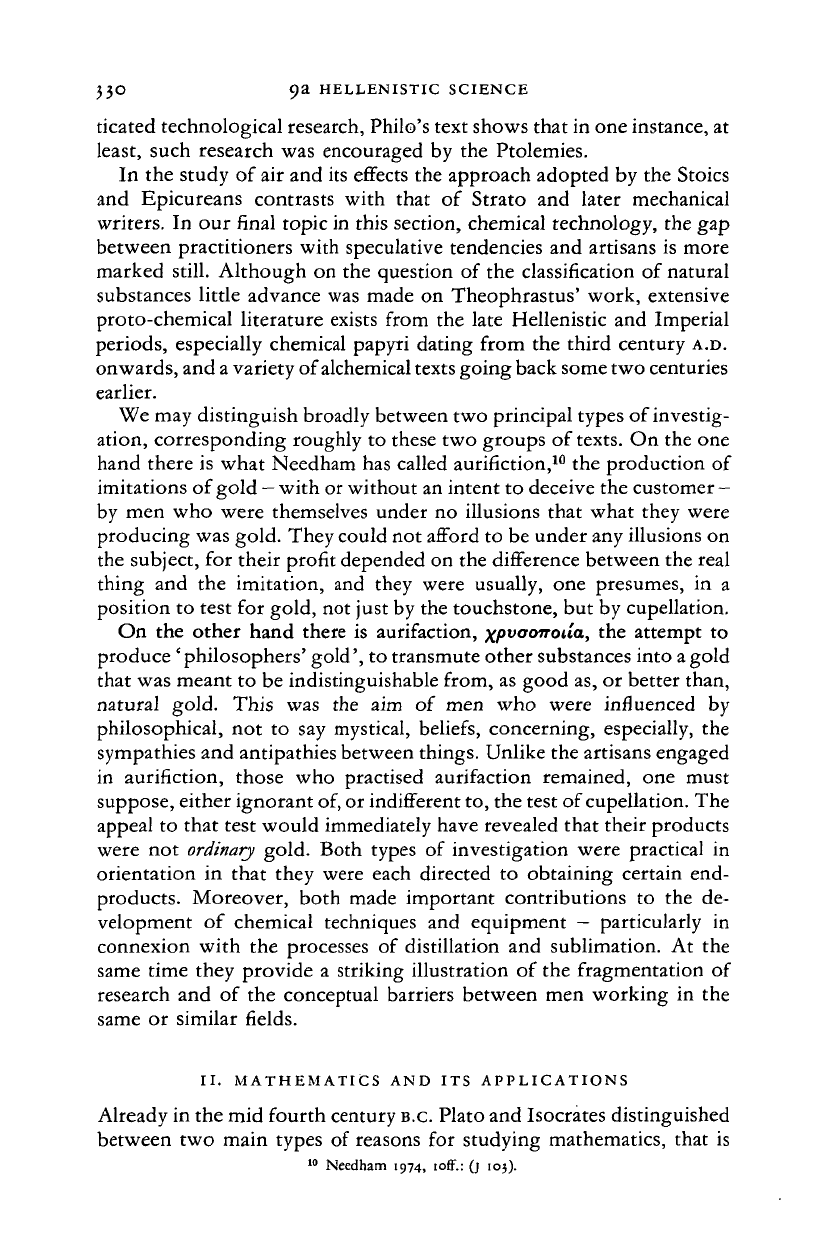
330 9
a
HELLENISTIC SCIENCE
ticated technological research, Philo's text shows that in one instance, at
least, such research was encouraged
by
the Ptolemies.
In the study of air and its effects the approach adopted by the Stoics
and Epicureans contrasts with that
of
Strato
and
later mechanical
writers.
In
our final topic in this section, chemical technology, the gap
between practitioners with speculative tendencies and artisans is more
marked still. Although on the question
of
the classification
of
natural
substances little advance was made on Theophrastus' work, extensive
proto-chemical literature exists from the late Hellenistic and Imperial
periods, especially chemical papyri dating from the third century
A.D.
onwards, and
a
variety of alchemical texts going back some two centuries
earlier.
We may distinguish broadly between two principal types of investig-
ation, corresponding roughly to these two groups of
texts.
On the one
hand there is what Needham has called aurifiction,
10
the production of
imitations of gold
-
with or without an intent to deceive the customer
-
by men who were themselves under no illusions that what they were
producing was gold. They could not afford to be under any illusions on
the subject, for their profit depended on the difference between the real
thing
and the
imitation,
and
they were usually, one presumes,
in a
position to test for gold, not just by the touchstone, but by cupellation.
On
the
other hand there
is
aurifaction, xp
vao7r
oiia, the attempt
to
produce ' philosophers' gold', to transmute other substances into
a
gold
that was meant to be indistinguishable from, as good as, or better than,
natural gold. This
was the aim of
men
who
were influenced
by
philosophical,
not to
say mystical, beliefs, concerning, especially,
the
sympathies and antipathies between things. Unlike the artisans engaged
in aurifiction, those who practised aurifaction remained,
one
must
suppose, either ignorant of, or indifferent to, the test of cupellation. The
appeal to that test would immediately have revealed that their products
were
not
ordinary
gold. Both types
of
investigation were practical
in
orientation
in
that they were each directed
to
obtaining certain end-
products. Moreover, both made important contributions
to the
de-
velopment
of
chemical techniques
and
equipment
—
particularly
in
connexion with
the
processes
of
distillation and sublimation.
At the
same time they provide
a
striking illustration
of
the fragmentation
of
research and
of
the conceptual barriers between men working
in the
same
or
similar fields.
II.
MATHEMATICS AND ITS APPLICATIONS
Already in the mid fourth century
B.C.
Plato and Isocrates distinguished
between two main types
of
reasons
for
studying mathematics, that
is
10
Needham 1974,
ioff.:
(j
103).
Cambridge Histories Online © Cambridge University Press, 2008
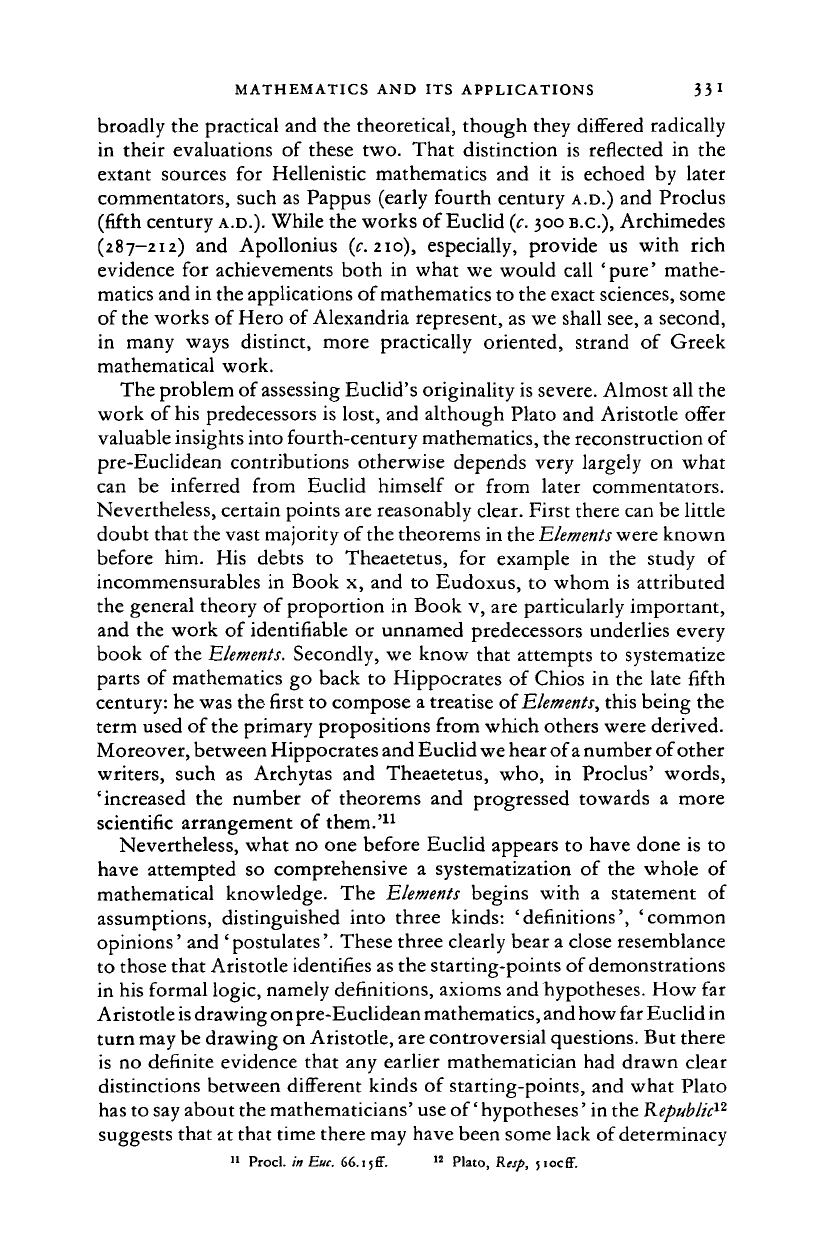
MATHEMATICS
AND ITS APPLICATIONS 331
broadly the practical and the theoretical, though they differed radically
in their evaluations of these two. That distinction is reflected in the
extant sources for Hellenistic mathematics and it is echoed by later
commentators, such as Pappus (early fourth century
A.D.)
and Produs
(fifth century
A.D.).
While the works of Euclid
(c.
300
B.C.),
Archimedes
(287-212) and Apollonius
(c.
210), especially, provide us with rich
evidence for achievements both in what we would call 'pure' mathe-
matics and in the applications of mathematics to the exact sciences, some
of the works of Hero of Alexandria represent, as we shall see, a second,
in many ways distinct, more practically oriented, strand of Greek
mathematical work.
The problem of assessing Euclid's originality is severe. Almost all the
work of his predecessors is lost, and although Plato and Aristotle offer
valuable insights into fourth-century mathematics, the reconstruction of
pre-Euclidean contributions otherwise depends very largely on what
can be inferred from Euclid himself or from later commentators.
Nevertheless, certain points are reasonably clear. First there can be little
doubt that the vast majority of the theorems in the
Elements
were known
before him. His debts to Theaetetus, for example in the study of
incommensurables in Book x, and to Eudoxus, to whom is attributed
the general theory of proportion in Book v, are particularly important,
and the work of identifiable or unnamed predecessors underlies every
book of the
Elements.
Secondly, we know that attempts to systematize
parts of mathematics go back to Hippocrates of Chios in the late fifth
century: he was the first to compose a treatise of
Elements,
this being the
term used of the primary propositions from which others were derived.
Moreover, between Hippocrates and Euclid
we
hear of
a
number of other
writers, such as Archytas and Theaetetus, who, in Proclus' words,
'increased the number of theorems and progressed towards a more
scientific arrangement of them.'
11
Nevertheless, what no one before Euclid appears to have done is to
have attempted so comprehensive a systematization of the whole of
mathematical knowledge. The Elements begins with a statement of
assumptions, distinguished into three kinds: 'definitions', 'common
opinions' and 'postulates'. These three clearly bear a close resemblance
to those that Aristotle identifies as the starting-points of demonstrations
in his formal logic, namely definitions, axioms and hypotheses. How far
Aristotle
is
drawing on pre-Euclidean mathematics, and how far Euclid in
turn may be drawing on Aristotle, are controversial questions. But there
is no definite evidence that any earlier mathematician had drawn clear
distinctions between different kinds of starting-points, and what Plato
has to say about the mathematicians' use of' hypotheses' in the
Republic
12
suggests that at that time there may have been some lack of determinacy
11
Procl. in Euc. 66.1 ;ff. " Plato, Resp,
jiocff.
Cambridge Histories Online © Cambridge University Press, 2008
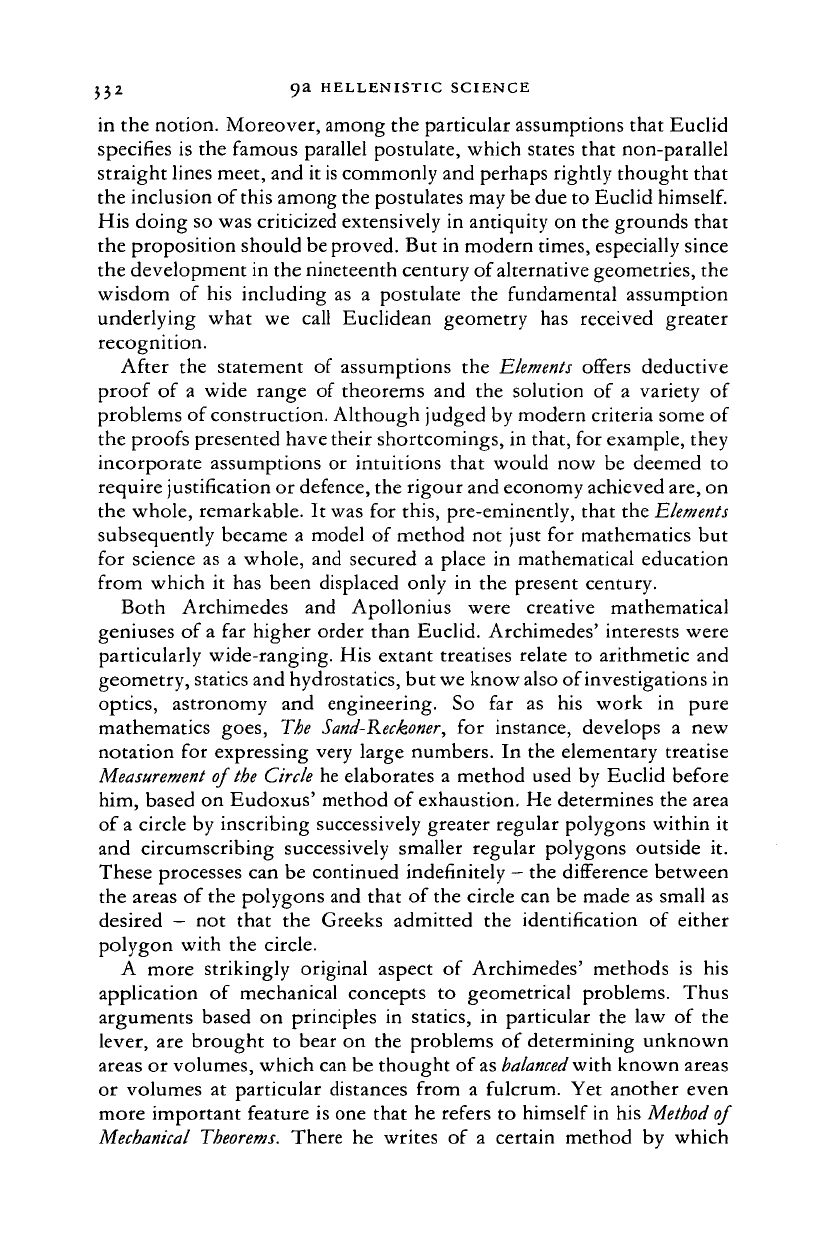
332 9
a
HELLENISTIC SCIENCE
in the notion. Moreover, among the particular assumptions that Euclid
specifies is the famous parallel postulate, which states that non-parallel
straight lines meet, and it
is
commonly and perhaps rightly thought that
the inclusion of
this
among the postulates may be due to Euclid
himself.
His doing so was criticized extensively in antiquity on the grounds that
the proposition should be proved. But in modern times, especially since
the development in the nineteenth century of alternative geometries, the
wisdom of his including as a postulate the fundamental assumption
underlying what we call Euclidean geometry has received greater
recognition.
After the statement of assumptions the
Elements
offers deductive
proof of a wide range of theorems and the solution of a variety of
problems of construction. Although judged by modern criteria some of
the proofs presented have their shortcomings, in that, for example, they
incorporate assumptions or intuitions that would now be deemed to
require justification or defence, the rigour and economy achieved are, on
the whole, remarkable. It was for this, pre-eminently, that the
Elements
subsequently became a model of method not just for mathematics but
for science as a whole, and secured a place in mathematical education
from which it has been displaced only in the present century.
Both Archimedes and Apollonius were creative mathematical
geniuses of a far higher order than Euclid. Archimedes' interests were
particularly wide-ranging. His extant treatises relate to arithmetic and
geometry, statics and hydrostatics, but we know also of investigations in
optics, astronomy and engineering. So far as his work in pure
mathematics goes, The
Sand-Reckoner,
for instance, develops a new
notation for expressing very large numbers. In the elementary treatise
Measurement
of
the Circle
he elaborates a method used by Euclid before
him, based on Eudoxus' method of exhaustion. He determines the area
of a circle by inscribing successively greater regular polygons within it
and circumscribing successively smaller regular polygons outside it.
These processes can be continued indefinitely
—
the difference between
the areas of the polygons and that of the circle can be made as small as
desired
—
not that the Greeks admitted the identification of either
polygon with the circle.
A more strikingly original aspect of Archimedes' methods is his
application of mechanical concepts to geometrical problems. Thus
arguments based on principles in statics, in particular the law of the
lever, are brought to bear on the problems of determining unknown
areas or volumes, which can be thought of
as balanced
with known areas
or volumes at particular distances from a fulcrum. Yet another even
more important feature is one that he refers to himself in his
Method of
Mechanical
Theorems.
There he writes of a certain method by which
Cambridge Histories Online © Cambridge University Press, 2008
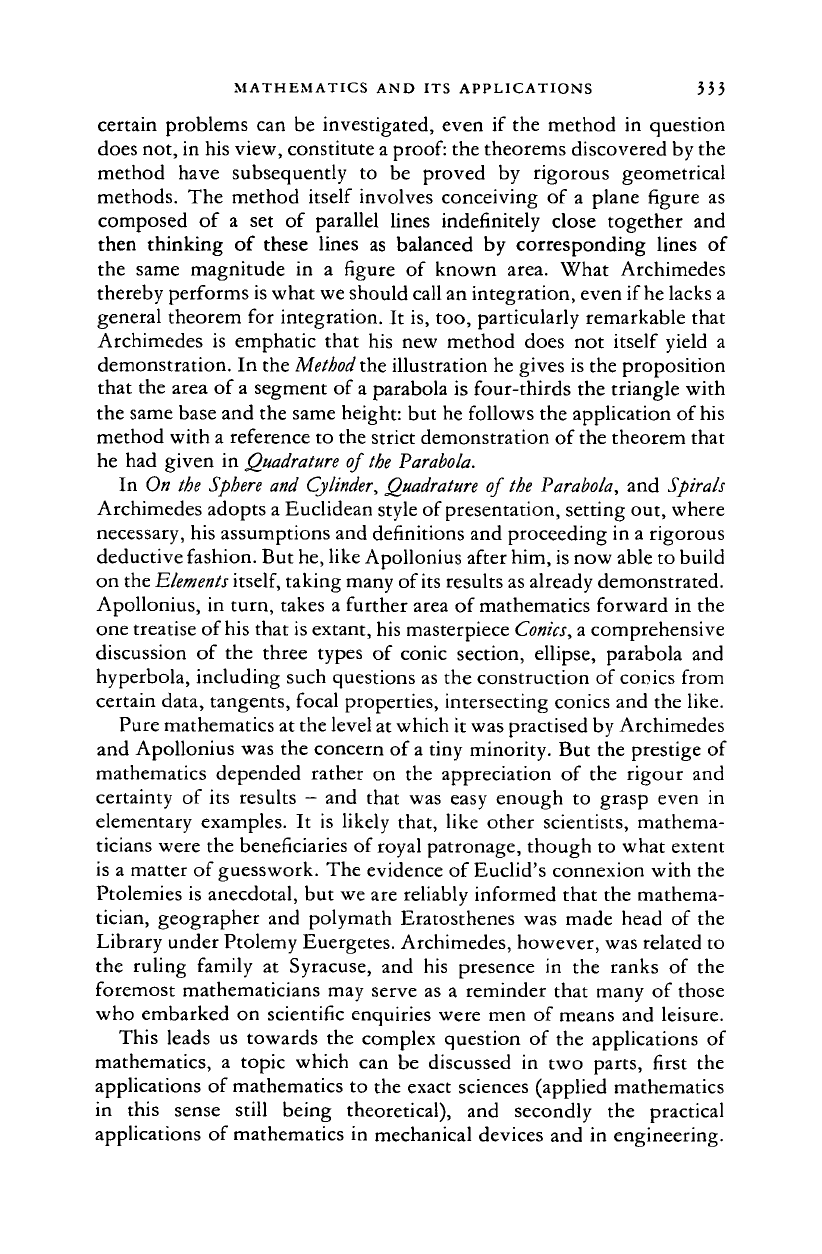
MATHEMATICS
AND ITS
APPLICATIONS
333
certain problems
can be
investigated, even
if the
method
in
question
does
not, in his
view, constitute a
proof: the
theorems discovered
by the
method have subsequently
to be
proved
by
rigorous geometrical
methods.
The
method itself involves conceiving
of a
plane figure
as
composed
of a set of
parallel lines indefinitely close together
and
then thinking
of
these lines
as
balanced
by
corresponding lines
of
the same magnitude
in a
figure
of
known area. What Archimedes
thereby performs is what we should call
an
integration, even
if
he
lacks
a
general theorem
for
integration.
It is, too,
particularly remarkable that
Archimedes
is
emphatic that
his new
method does
not
itself yield
a
demonstration.
In the
Method
the illustration
he
gives
is the
proposition
that
the
area
of
a segment
of
a parabola
is
four-thirds
the
triangle with
the same base
and the
same height:
but he
follows
the
application
of
his
method with
a
reference
to the
strict demonstration
of
the theorem that
he
had
given
in
Quadrature
of
the
Parabola.
In
On the
Sphere
and
Cylinder, Quadrature
of
the Parabola,
and
Spirals
Archimedes adopts
a
Euclidean style
of
presentation, setting
out,
where
necessary,
his
assumptions
and
definitions
and
proceeding
in a
rigorous
deductive fashion.
But
he, like Apollonius after him, is
now
able
to
build
on the
Elements
itself,
taking many
of
its
results as already demonstrated.
Apollonius,
in
turn, takes
a
further area
of
mathematics forward
in the
one treatise
of
his
that
is
extant,
his
masterpiece
Conies,
a
comprehensive
discussion
of the
three types
of
conic section, ellipse, parabola
and
hyperbola, including such questions
as the
construction
of
conies from
certain data, tangents, focal properties, intersecting conies
and the
like.
Pure mathematics
at
the level
at
which
it
was practised
by
Archimedes
and Apollonius
was the
concern
of
a tiny minority.
But the
prestige
of
mathematics depended rather
on the
appreciation
of the
rigour
and
certainty
of its
results
—
and
that
was
easy enough
to
grasp even
in
elementary examples.
It is
likely that, like other scientists, mathema-
ticians were
the
beneficiaries
of
royal patronage, though
to
what extent
is
a
matter
of
guesswork.
The
evidence
of
Euclid's connexion with
the
Ptolemies
is
anecdotal,
but we are
reliably informed that
the
mathema-
tician, geographer
and
polymath Eratosthenes
was
made head
of the
Library under Ptolemy Euergetes. Archimedes, however,
was
related
to
the ruling family
at
Syracuse,
and his
presence
in the
ranks
of the
foremost mathematicians
may
serve
as a
reminder that many
of
those
who embarked
on
scientific enquiries were
men of
means
and
leisure.
This leads
us
towards
the
complex question
of the
applications
of
mathematics,
a
topic which
can be
discussed
in two
parts, first
the
applications
of
mathematics
to the
exact sciences (applied mathematics
in this sense still being theoretical),
and
secondly
the
practical
applications
of
mathematics
in
mechanical devices
and in
engineering.
Cambridge Histories Online © Cambridge University Press, 2008
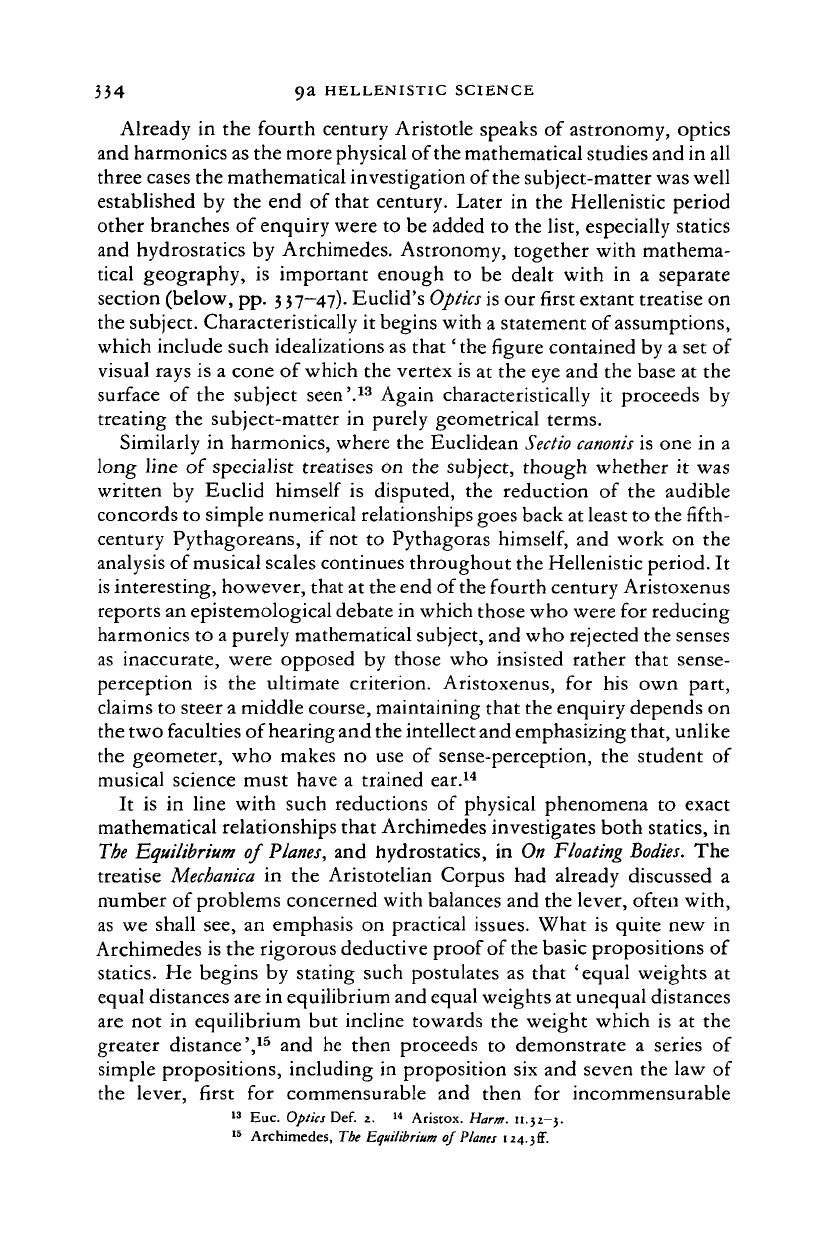
334 9
a
HELLENISTIC SCIENCE
Already
in
the fourth century Aristotle speaks
of
astronomy, optics
and harmonics as the more physical of the mathematical studies and in all
three cases the mathematical investigation of the subject-matter was well
established
by
the end of that century. Later
in
the Hellenistic period
other branches of enquiry were to be added to the list, especially statics
and hydrostatics by Archimedes. Astronomy, together with mathema-
tical geography,
is
important enough
to be
dealt with
in a
separate
section (below, pp.
3
37-47).
Euclid's
Optics
is our first extant treatise on
the subject. Characteristically it begins with a statement of assumptions,
which include such idealizations as that 'the figure contained by a set of
visual rays is a cone of which the vertex is at the eye and the base at the
surface
of
the subject seen'.
13
Again characteristically
it
proceeds
by
treating the subject-matter
in
purely geometrical terms.
Similarly in harmonics, where the Euclidean
Sectio canonis
is one in
a
long line
of
specialist treatises
on
the subject, though whether
it
was
written
by
Euclid himself
is
disputed,
the
reduction
of
the audible
concords to simple numerical relationships goes back at least to the fifth-
century Pythagoreans,
if
not
to
Pythagoras
himself,
and work
on the
analysis of musical scales continues throughout the Hellenistic period.
It
is
interesting, however, that at the end of the fourth century Aristoxenus
reports an epistemological debate in which those who were for reducing
harmonics to a purely mathematical subject, and who rejected the senses
as inaccurate, were opposed
by
those who insisted rather that sense-
perception
is the
ultimate criterion. Aristoxenus,
for his own
part,
claims to steer a middle course, maintaining that the enquiry depends on
the two faculties of hearing and the intellect and emphasizing that, unlike
the geometer, who makes
no
use
of
sense-perception,
the
student
of
musical science must have
a
trained ear.
14
It
is in
line with such reductions
of
physical phenomena
to
exact
mathematical relationships that Archimedes investigates both statics, in
The Equilibrium
of
Planes,
and
hydrostatics,
in
On Floating
Bodies.
The
treatise
Mecbanica
in the
Aristotelian Corpus
had
already discussed
a
number of problems concerned with balances and the lever, often with,
as we shall see,
an
emphasis
on
practical issues. What
is
quite new
in
Archimedes is the rigorous deductive proof of the basic propositions of
statics. He begins
by
stating such postulates
as
that 'equal weights
at
equal distances are in equilibrium and equal weights at unequal distances
are
not in
equilibrium but incline towards the weight which
is at the
greater distance',
15
and he
then proceeds
to
demonstrate
a
series
of
simple propositions, including
in
proposition six and seven the law of
the lever, first
for
commensurable
and
then
for
incommensurable
13
Euc. Optics Def.
2.
14
Aristox. Harm. 11.32—3.
15
Archimedes, The
Equilibrium
of
Planes
124.3?.
Cambridge Histories Online © Cambridge University Press, 2008
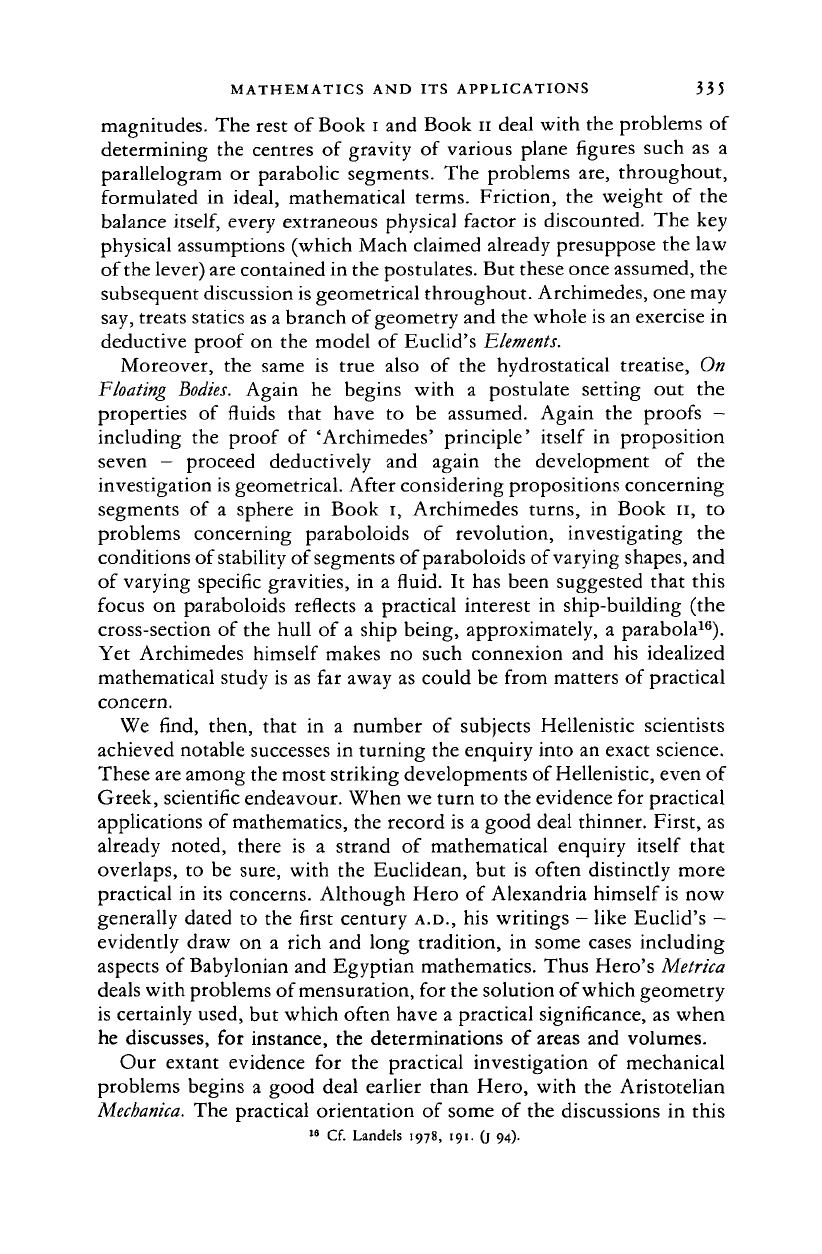
MATHEMATICS AND ITS APPLICATIONS 33
5
magnitudes. The rest
of
Book
i and
Book
n
deal with the problems
of
determining
the
centres
of
gravity
of
various plane figures such
as a
parallelogram
or
parabolic segments.
The
problems
are,
throughout,
formulated
in
ideal, mathematical terms. Friction,
the
weight
of the
balance
itself,
every extraneous physical factor
is
discounted.
The key
physical assumptions (which Mach claimed already presuppose the law
of the lever) are contained in the postulates. But these once assumed, the
subsequent discussion is geometrical throughout. Archimedes, one may
say, treats statics as a branch of geometry and the whole is an exercise
in
deductive proof
on the
model
of
Euclid's
Elements.
Moreover,
the
same
is
true also
of the
hydrostatical treatise,
On
Floating
Bodies.
Again
he
begins with
a
postulate setting
out the
properties
of
fluids that have
to be
assumed. Again
the
proofs
-
including
the
proof
of
'Archimedes' principle' itself
in
proposition
seven
-
proceed deductively
and
again
the
development
of the
investigation is geometrical. After considering propositions concerning
segments
of a
sphere
in
Book
i,
Archimedes turns,
in
Book
n, to
problems concerning paraboloids
of
revolution, investigating
the
conditions of stability of segments of paraboloids of varying shapes, and
of varying specific gravities,
in a
fluid.
It has
been suggested that this
focus
on
paraboloids reflects
a
practical interest
in
ship-building
(the
cross-section
of
the hull
of
a ship being, approximately,
a
parabola
16
).
Yet Archimedes himself makes
no
such connexion
and his
idealized
mathematical study
is as far
away as could
be
from matters
of
practical
concern.
We find, then, that
in a
number
of
subjects Hellenistic scientists
achieved notable successes
in
turning the enquiry into an exact science.
These are among the most striking developments of
Hellenistic,
even of
Greek, scientific endeavour. When we turn
to
the evidence
for
practical
applications
of
mathematics,
the
record is
a
good deal thinner. First,
as
already noted, there
is a
strand
of
mathematical enquiry itself that
overlaps,
to be
sure, with
the
Euclidean,
but is
often distinctly more
practical
in its
concerns. Although Hero
of
Alexandria himself is
now
generally dated
to the
first century
A.D.,
his
writings
—
like Euclid's
—
evidently draw
on a
rich
and
long tradition,
in
some cases including
aspects
of
Babylonian and Egyptian mathematics. Thus Hero's Metrka
deals with problems of mensuration,
for
the solution of which geometry
is certainly used, but which often have
a
practical significance, as when
he discusses,
for
instance,
the
determinations
of
areas
and
volumes.
Our extant evidence
for the
practical investigation
of
mechanical
problems begins
a
good deal earlier than Hero, with
the
Aristotelian
Mechanica.
The
practical orientation
of
some
of
the discussions
in
this
16
Cf.
Landels 1978, 191.
(j 94).
Cambridge Histories Online © Cambridge University Press, 2008
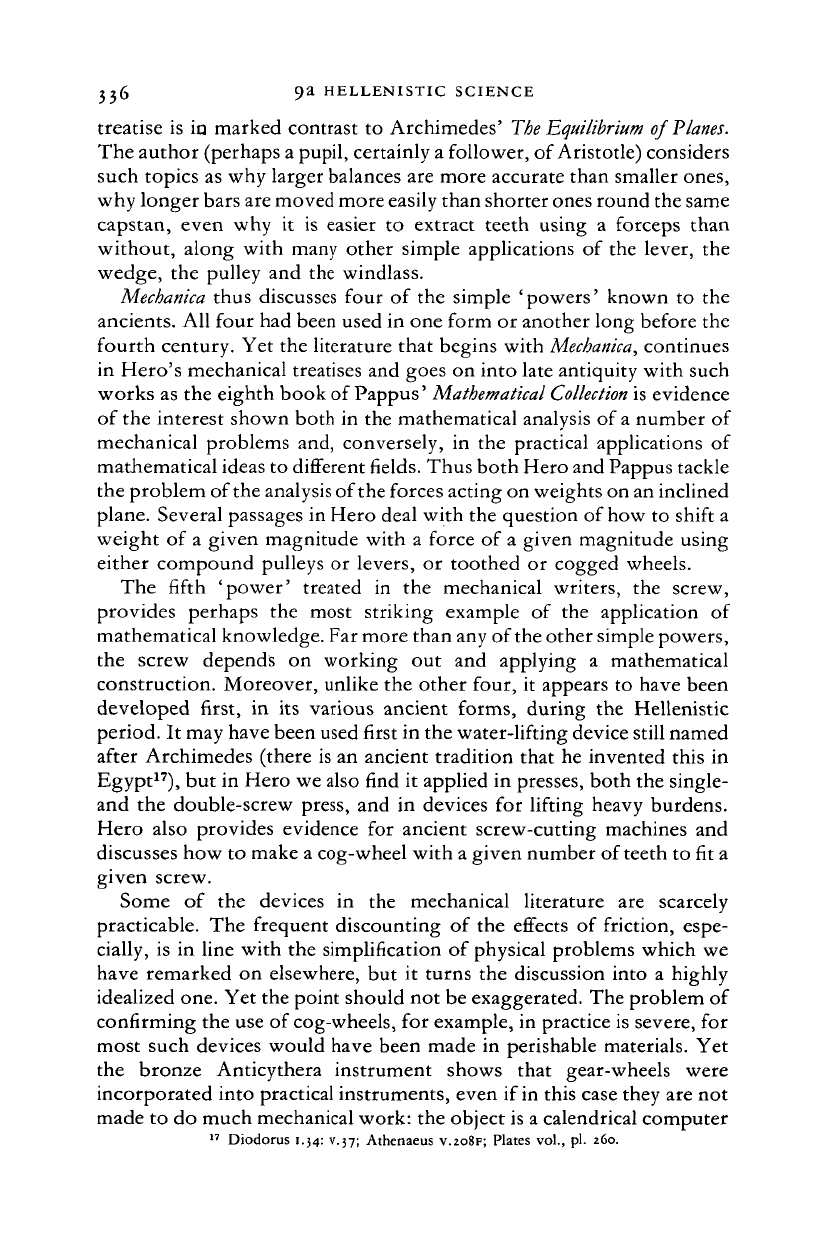
9
a
HELLENISTIC SCIENCE
treatise
is in
marked contrast
to
Archimedes'
The Equilibrium
of
Planes.
The author (perhaps a pupil, certainly a follower, of Aristotle) considers
such topics as why larger balances are more accurate than smaller ones,
why longer bars are moved more easily than shorter ones round the same
capstan, even why
it is
easier
to
extract teeth using
a
forceps than
without, along with many other simple applications
of
the lever,
the
wedge, the pulley and the windlass.
Mechanica
thus discusses four
of
the simple 'powers' known
to the
ancients. All four had been used in one form or another long before the
fourth century. Yet the literature that begins with
Mechanica,
continues
in Hero's mechanical treatises and goes on into late antiquity with such
works as the eighth book of Pappus'
Mathematical Collection
is evidence
of the interest shown both in the mathematical analysis of
a
number of
mechanical problems and, conversely,
in the
practical applications
of
mathematical ideas to different fields. Thus both Hero and Pappus tackle
the problem of the analysis of the forces acting on weights on an inclined
plane. Several passages in Hero deal with the question of how to shift a
weight
of
a given magnitude with
a
force
of
a given magnitude using
either compound pulleys
or
levers,
or
toothed
or
cogged wheels.
The fifth 'power' treated
in the
mechanical writers,
the
screw,
provides perhaps
the
most striking example
of the
application
of
mathematical knowledge. Far more than any of the other simple powers,
the screw depends
on
working
out and
applying
a
mathematical
construction. Moreover, unlike the other four,
it
appears
to
have been
developed first,
in its
various ancient forms, during
the
Hellenistic
period. It may have been used first in the water-lifting device still named
after Archimedes (there is an ancient tradition that he invented this
in
Egypt
17
),
but in Hero we also find
it
applied in presses, both the single-
and
the
double-screw press, and
in
devices
for
lifting heavy burdens.
Hero also provides evidence
for
ancient screw-cutting machines and
discusses how to make a cog-wheel with a given number of teeth to
fit
a
given screw.
Some
of the
devices
in the
mechanical literature
are
scarcely
practicable. The frequent discounting
of
the effects
of
friction, espe-
cially,
is in
line with the simplification
of
physical problems which we
have remarked
on
elsewhere, but
it
turns the discussion into
a
highly
idealized one. Yet the point should not be exaggerated. The problem of
confirming the use of cog-wheels, for example, in practice is severe, for
most such devices would have been made
in
perishable materials. Yet
the bronze Anticythera instrument shows that gear-wheels were
incorporated into practical instruments, even if
in
this case they are not
made to do much mechanical work: the object is a calendrical computer
" Diodorus 1.34: v.37; Athenaeus V.208F; Plates vol., pi. 260.
Cambridge Histories Online © Cambridge University Press, 2008
